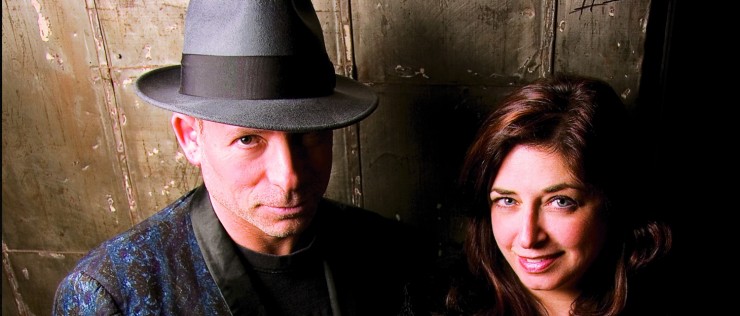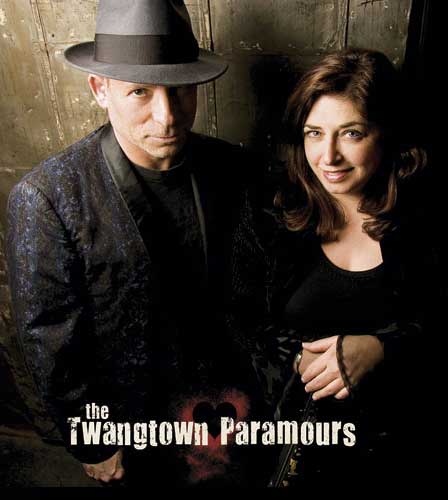Mike T. Lewis and MaryBeth Zamer: The romance came first.Artists On the Verge 2011
It’s Only Love
Mike T. Lewis and MaryBeth Zamer—aka The Twangtown Paramours—make sweet music on stage, on record, and at home.
By David McGee
Love hurts, love wounds, love scars, love elevates. When harm is done no love can be won, as the McGarrigle Sisters memorably lamented, but it’s only love that can wreck a human being and turn him inside out. Fortune favors few.
Mike T. Lewis and MaryBeth Zamer understand these truths. As the Twangtown Paramours, they explore the phenomenon of love from multiple angles on their impressive, self-titled debut album, much as they do in their personal lives, now that they are no longer mere paramours but honest to God husband and wife, as of December 17, 2010.
“I’ll be the fiery light of a meteorite/flying and dying away/don’t let the dark/frighten you none/I know the night looks lonely and black/if I’m forever circling the sun/I’ll still love you ‘til the moon and back” —“The Moon and Back,” by Mike T. Lewis, Twangtown Paramours
Mike and MaryBeth came into each other’s orbits in the most circuitous way. The man of the house is “kind of from all over,” he says: born in New York City, mostly grew up in New Jersey, lived for awhile in Vermont (“because I love ski racing”), lived in Mississippi and Los Angeles, and has been in Nashville eight years. A bassist and guitarist, he’s toured as a member of Jimmie Dale Gilmore’s band; as a songwriter he’s had a massive #1 pop hit in South Korea (“A Heartbeat Away” by Yang Pa) and had his songs cut by a variety of indie artists on these shores, in the U.K. and in Japan. He also has his own studio in Nashville.
MaryBeth Zamer: The singing Federal prosecutorMaryBeth hails from Washington, D.C.—not the D.C. area, but the District of Columbia proper (“I actually was born there”)—and grew up in “the great state of Maryland, home of the Baltimore Orioles and the best blue crab in the world, close to the Washington Redskins.” Her musical odyssey began in junior chorus, when she was in seventh grade, where the teacher was so taken with her voice that she gave MaryBeth personal voice lessons throughout her school years. Aiming for a career singing light opera and musical theater, she spent her spare time singing in bands, and continued doing so after graduating from college, specifically in band called Ignition, a local cover band in D.C., where she met and befriended young Eva Cassidy, who was on her way to being one of the great singers of our time when she died of melanoma, at age 36, in 1996. MaryBeth sang background vocals in Cassidy’s band Method Actor until 1991, when she relocated to Nashville.
“I did not move to sing,” MaryBeth explains. “I moved because my then-husband was going to school here, and I had just graduated from law school and came here to practice while he was in school. Once I got here, we had children, and I did some live stuff; but I did mostly demo work, studio work.”
The experience of working with Ms. Cassidy left MaryBeth with not only warm personal memories—“A sweetheart of a person. People write about how shy she was, and she was, but when you got to know her she had this great sense of humor. She laughed all the time when you got to know her. My memories of her are of sitting with her backstage at a couple of the venues we played, just laughing.”—but also some indelible pointers in the vocal art.
“What I learned mostly from her is that she really considered the emotion of the song and really felt the song,” MaryBeth says. “I used to say she sang from her toes all the way up, because she was such an emotional singer. I definitely learned that from her, how important it is to deliver the emotion of a song.”
The Twangtown Paramours the Acoustic Coffeehouse, ‘Might As Well Be You,’ from the duo’s debut album.But there’s more to Ms. Zamer than meets the ear. She is, in her day job, an attorney with the U.S. Department of Labor in Nashville, supervising the team of attorneys who try cases relating to coal mining, a recent promotion from being one of the attorneys actually trying the cases in court.
“I’ve been going to eastern Kentucky for twenty years,” she says, “and every time I go the landscape has changed because someone else has been engaged in mountaintop mining and you’re like, ‘Where is the mountain? Where did it go?’”
“MaryBeth, the singing Federal prosecutor,” Mike interjects.
With songwriting teams the clichéd question is “What came first? The words or the music?” But with the Paramours, it’s “What came first? The music or the romance?”
“Definitely the romance came first,” MaryBeth asserts with prosecutorial certainty. For the record, both parties were divorced at that time, and MaryBeth is the mother of two daughters (now ages 15 and 11) by her first marriage.
“We met at a studio here in town awhile ago, and then the relationship got going,” Mike explains. “MaryBeth was interested in finishing up a jazz project she had, and I was going to help her with that, with mixed feelings, because I used to be a jazz guitar player. That’s one of the things I did as a kid. I was a little burnt out on that musically and wasn’t sure I wanted to go backwards. But I was going to demo one of my songs, ‘Nowhere To Go,’ and she had some ideas on it and said ‘Let’s see what I sound like on it.’ It sort of changed the flavor of what we were doing. Then I had her demo two other songs, and at that point I had a cohesive sound and an idea of where we wanted to go.”
“It was funny, because he would play his songs for me that he had other female vocalists demo, and I was thinking, I would love to sing that!” MaryBeth adds with a laugh. “But you know, I didn’t want to be presumptuous and I didn’t want to say I could do a better job on that than they did, so I didn’t say anything. But there were so many songs of his I wanted to sing. It was kind of funny that it turned out that way. I finally opened my mouth when he didn’t know where to go. He wrote it as a guy song, and I said, ‘That would be a great girl song,’ and he didn’t believe me.”
Mike: “I try to write songs that are ambidextrous.”
“We were dating and I was trying hard not to let him know how badly I wanted to sing the songs he was writing. But I finally just couldn’t take it anymore,” MaryBeth adds.
As an interviewer comes to understand, the above is a typical pattern of conversation between Mr. Lewis and Ms. Zamer—they’re very good at answering in something like two-part harmony. They don’t finish each other’s sentences (yet); rather, they amplify each other’s perspective. It’s a heady give-and-take they engage in that reveals the confidence they have in each other’s opinions as well as the healthy attitude they share with respect to musical matters.
To wit:
MaryBeth: “It’s interesting, there’s a song on the CD, ‘Moon And Back,’ that he wrote for my youngest daughter. The first time he sang it to me I loved the way he did it. And for a long time—probably for about a year—we started out playing writer’s nights locally—I didn’t sing that song because I didn’t think I had done a very good job on it. I thought he did, he sang it better. And it took me awhile before I thought, Okay, I can do this now and it sounds okay.
Mike: “Now you sing it a lot better than I do.”
MaryBeth: “Now I take everything. ‘Oh, can I sing that? Can I sing that?’ He writes it and I’m like, ‘Give it here.’ I’m not shy about taking them now.”
The writer’s nights Mike and MaryBeth were playing together starting in early 2009 were going so well the couple began to seek what Mike calls “real gigs,” with the aim of going out “purposely to make mistakes and to find out what they were.”
“And we did a really job at it!” MaryBeth exclaims. “We accomplished our goal!”
Something good came of those “real gigs”: their individual strengths as musicians came to the fore, and they sensed something special aborning.
Mike: “We’ve both been in the music business for a long time and we both have a pretty good quality control department going, especially me.”
MaryBeth: “Mike is a perfectionist; I’m the fun one. I will say that since I have been both in a relationship with him and performing with him, he has such a good ear and I have an ear for the emotion and the feeling of the song, and he actually has the technical ear. So I really feel like my singing has improved in terms of accuracy with him, and I think, hopefully, I’ve helped him hear some of the more emotional aspects of the songs.”
Mike: “I have a fine emotional ear, but I don’t usually tell you too much what to do in that department because you are often doing the right thing, or something I didn’t think of, or something better than I would have thought of.”
MaryBeth: “Phrasing is something I learned from Eva. Phrasing is really important in terms of getting the song across. I really think a lot about phrasing and will rehearse it and try different things. At those writers’ nights, we had a chance to try things and see what worked and what didn’t. Before we record songs—and I know Mike feels the same way—we really like to play them out quite a bit before we get into the studio because they change a little bit.”
Out of all this experimentation in public came the duo’s first album, The Twangtown Paramours, a total delight of smart songs abundant in heart and wit, discrete but engaged musical support, and hearty, soul-flavored vocals by Ms. Zamer that are all the more captivating for their alluring, seductive quality: the country in her comes through clearly, but she has a way of selling a song with sophisticated, complex emotional shadings that suggest she could work wonders with the Great American Songbook and in church as well. Mr. Lewis leaves most of the vocalizing to his Twangtown paramour, but has a striking moment of his own on his lovely, guitar-and-dobro billet doux, “Ciara My Dear” (pronounced Keer-a), a heart tugging romantic plea to a damaged soul reluctant to “surrender and let me dry your tears,” which succeeds not only on the basis of melody and austere ambiance, but also by the singer’s plainspoken but nuanced beseeching of his reluctant inamorata. His voice, clear and a bit reedy, is an effective folk-flavored instrument, but it really shines when he settles into plush harmony with MaryBeth’s.
The Twangtown Paramours at the Bluebird, Nashville, ‘Will You Turn To Me,’ December 19, 2010In an album defined by gentle, folk-country rhythms and atmospheres created with admirable subtlety by a tight ensemble of guitar, bass, drums, dobro, pedal steel and the occasional keyboard; measured readings of compelling benevolence; and literate writing exploring the ways of the heart—there are breakups, unions and reunions all going on here—it’s hardly surprising to find so many songs with a positive, balanced perspective, a healthy attitude towards the twists and turns and what becomes of people who wrap their lives around each other’s. The catchiest song here, “Might As Well Be You,” a sturdy, propulsive shuffle with a soaring chorus demanding to be sung along with, finds the narrator ignoring “the ghosts of bad choices,” accepting the inevitability of heartbreak (“all I’ve known, all I’ve been shown, are the thousand ways love dies”) and embracing with cool equanimity the certainty of being dumped by the current object of her affection as the best of all possible outcomes. In “On My Way,” the album opening ballad, the singer, framed by a decidedly southwest-flavored arrangement rich in fiddle and dobra, is packing up and leaving, saying sayonara to a failed relationship, but matter of factly, without bitterness, accepting the toll exacted as the price paid for her commitment, now beginning a new chapter as she vows to let her ex’s memory fade—but adding, “if I can’t forget/I’ll try to forgive.” When things are good, they’re really good, and the Paramours state this as clearly as they outline the speed bumps in other songs—in terms “Simple and True,” to cite the quiet, fingerpicked ballad that seems the album’s emotional center in its frank admission of how the real thing can defy explanation and definition both, and is best understood as a feeling, “like this simple ache I have for you…and it’s simple and true,” (“That was really about my ex-wife before we got married,” Mike explains, “and before she threw me out of the house and before she became my ex-wife.”); or, as delineated in the soft shuffle of “Under the Next Blue Sky,” in acknowledging the certainty of love’s persistence no matter the distance between partners or the turning of the earth. Its key lyric, “We’ve listened for God’s footsteps/we hear the falling maple leaves,” a powerful evocation of faith and a sense of being part of a larger mystery in nature, is the Jimmie Dale Gilmore influence rubbing off on Mike’s songwriting. “That’s a little Buddhism sticking out there, and a little bit of Vermont, the maple leaves,” he says. “It is saying love endures, but gosh, who knows how long it can endure? I don’t have the answers—first of all I’m not a religious person at all—
“I’m the religious one,” MaryBeth pipes up. “It’s kind of funny.”
“—and I don’t have answers about how the universe works, or life and death or anything like that, but I can ask a couple of questions to make people think.”
Ultimately, the Paramours’ outlook is summarized in the penultimate track, “Rise,” its shifting textures and more forceful thrust foreshadowing and enhancing each verse’s affirmation of the point the stories here have made, to wit: “Everything must fall away/and everything must rise.” The Paramours’ voices harmonize and elevate on the word “rise,” carrying it and the song forward, infusing it with hope and possibility. There’s the rub—hope and possibility, from a couple who carry themselves with a positive, supportive attitude more common to new, unseasoned artists than veterans who have seen, if not experienced, the music business’s merciless ways.
The Twangtown Paramours, ‘You Play Me (Like a Radio),’ from the duo’s debut album. Live at the Bluebird, Nashville, December 19, 2010Though he hopes he’ll get the call if Jimmie Dale embarks on another solo tour, Mike is laser-focused on developing the Paramours. “This is it,” he asserts. “We’re writing and getting ready to record new stuff for the second album. That’s what it’s about for me.”
Being the singing Federal prosecutor, MaryBeth has imposing responsibilities to the Department of Labor, but she too harbors hopes of the duo getting established and becoming profitable. Equally, if not more important, is gaining more exposure for her husband’s songs, hinting in her answer that other artists in need of material might find a fruitful reservoir in the Lewis catalogue.
“For me, the purpose of the whole project was to get Mike’s music heard, because his songs are not Nashville country mainstream kind of songs, and I just really wanted to get his music heard. I think it’s really well written, beautiful stuff. Ultimately we would love to be able to tour and play and tour and play, and not do anything else. Right now we’re just trying to build an audience and play more gigs. We have a couple of people helping us get bookings, and we’re just trying to play as much as we can and get our music heard as much as we can.”
As the McGarrigles reminded us, it’s only love. It’s only love.
The Twangtown Paramours is available at www.cdbaby.com
THE BLUEGRASS SPECIAL
Founder/Publisher/Editor: David McGee
Contributing Editors: Billy Altman, Laura Fissinger, Christopher Hill, Derk Richardson
Logo Design: John Mendelsohn (www.johnmendelsohn.com)
Website Design: Kieran McGee (www.kieranmcgee.com)
Staff Photographers: Audrey Harrod (Louisville, KY; www.flickr.com/audreyharrod), Alicia Zappier (New York)
E-mail: thebluegrassspecial@gmail.com
Mailing Address: David McGee, 201 W. 85 St.—5B, New York, NY 10024
Founder/Publisher/Editor: David McGee
Contributing Editors: Billy Altman, Laura Fissinger, Christopher Hill, Derk Richardson
Logo Design: John Mendelsohn (www.johnmendelsohn.com)
Website Design: Kieran McGee (www.kieranmcgee.com)
Staff Photographers: Audrey Harrod (Louisville, KY; www.flickr.com/audreyharrod), Alicia Zappier (New York)
E-mail: thebluegrassspecial@gmail.com
Mailing Address: David McGee, 201 W. 85 St.—5B, New York, NY 10024




